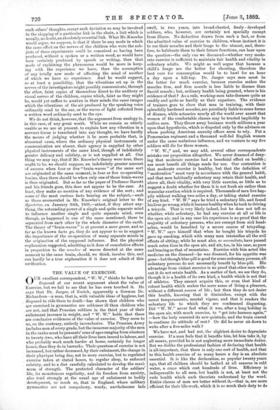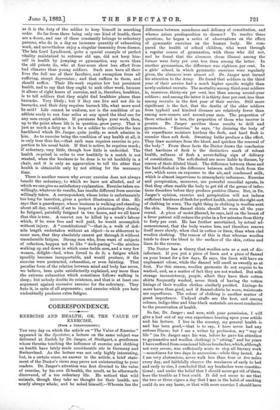THE VALUE OF EXERCISE.
,OUR excellent correspondent, " W. W.," thinks he has quite disposed of our recent argument about the value of Exercise, but we fail to see that he has even touched it. He .says that Dr. Jaeger, of Zurich, apparently a German Dr. Richardson—a man, that is, with valuable ideas of hygiene, but disposed to ride them to death—has shown that children who are exercised in gymnastics are seldomer ill than children who are not, and that Prussian soldiers in the third year of their enlistment increase in weight, and " W. W." holds that these are conclusive evidences of the value of exercise. They seem to us, on the contrary, entirely inconclusive. The Prussian Army includes men of every grade, but the immense majority of the men in the ranks must be peasants' sons of ages ranging from nineteen to twenty -two, who have all their lives been inured to labour, and who probably work much harder at home, certainly for longer hours, than they do in barracks. Their quantum of exercise is not increased, but rather decreased, by their enlistment, the change in their physique being due, not to more exercise, but to regulated exercise taken at stated hours, to regular sleep, to enforced sobriety, and to a diet carefully calculated to develop the maxi- mum of strength. The protected character of the soldiers' life, its monotonous regularity, and its freedom from anxiety, also tend strongly at the usual age of enlistment to bodily development, so much so, that in England, where military gymnastics are not compulsory, weedy, unwholesome lads
swell, in two years, into broad-chested, finely - developed soldiers, who, however, are certainly not specially exempt from illness. No deduction drawn from such a fact, or from the admitted value of exercise to children, whose instinct it is to use their muscles and their lungs to the utmost, and, there- fore, to habituate them to their future functions, can bear upon the question—the only one we discussed—whether very mode- rate exercise is sufficient to maintain fair health and vitality in sedentary adults. We might as well argue that because a child's lungs are the better for shouting, therefore the best cure for consumption would be to bawl for an hour a day upon a hill-top. Dr. Jaeger says men must be the better for much exercise, because exercise makes the muscles firm, and firm muscle is less liable to disease than flaccid muscle ; but, ordinary health being granted, where is his evidence of that ? As a rule, working-men take diseases quite as readily and quite as hardly as their superiors. The evidence of trainers goes to show that men in training, with their splendidly hardened muscles, are peculiarly liable to some forms of disease, while actuaries nearly all the world over assert that women of the comfortable classes may be trusted implicitly to outlive men. They throw away business worth millions a year upon that hypothesis, which is disputed only by the advisers on whom pushing American annuity offices seem to rely. Pat a Pomeranian regiment and a thousand well-fed English women under the same malarious influence, and we venture to say five soldiers will die for three women.
" W. W.," and, we may add, several other correspondents mistake our proposition altogether. We never dreamed of deny- ing that moderate exercise had a beneficial effect on health ; use must benefit all things made for use. Our contention is that moderate exercise is healthy, but that the definition of " moderation " must vary in accordance with the general habit, and that men habitually sedentary may retain their health, and above all, their vitality, with very little exercise, so little as to suggest a doubt whether for them it is not fresh air rather than muscular exertion which is required. Thousands of men live hap- pily without walking two miles a day, or taking stated exercise of any kind. " W. W." says he tried a sedentary life, and found his liver go wrong, while it became healthy when he took to driving a tricycle. That is very likely indeed, but he does not tell us whether, while sedentary, he had any exercise at all or life in the open air, and in any case his experience is no proof that the majority of sedentary persons, who are exempt from sick head- aches, would be benefited by a severe course of tricycling. " W. W." says himself that when he bought his tricycle he gave up smoking, which with many men intensifies all the evil effects of sitting; while he must also, as necessitate, have passed much extra time in the open air, and air, too, in his case, as pure and bracing as that of mountains. Exercise with him acted like medicine on the diseased—he was diseased, for his appetite was gone—but though blue-pill is good for some sedentary persons, all sedentary persons do not necessarily benefit by blue-pill. His advantage from violent exercise is no proof that other men with- out it do not retain health. As a matter of fact, we see they do, though it is a health of its own kind, a health which is not that of athletes. They cannot acquire this, or even that kind of robust health which makes the mere sense of living a pleasure, without a different course of life ; but then they do not desire this health, knowing that it diminishes, except with the rarest temperaments, mental vigour, and that it renders the sedentary life to which they are condemned disgusting. Did " W. W." never feel what it was, after a long holiday in the open air, with much exercise, to "get into harness again," —how the body resented its new quietude, and the brain craved to continue its attitude of rest ? Or did he never sit down to write after a five-miles walk ?
We have sot, and had not, the slightest desire to depreciate exercise. If a man feels that it benefits him, let him take it, by all means, provided he is not neglecting more immediate duties. But we dislike the professional fashion of declaring that health is all-important, that there is only one sort of health, and that to this health exercise of so many hours a day is an absolute essential. It is like the declaration, so popular twenty years ago, that all children should be bathed at all seasons in cold water, a craze which cost hundreds of lives. Efficiency is indispensable to all men, but health is not, at least not the rude health which such theorists understand by the word. Entire classes of men are better without it,—that is, are more efficient for their life-work, which it is as much their duty to do
as it is the duty of the soldier to keep himself in marching order. So far from there being only one kind of health, there are a dozen, and one of them constantly belongs to sedentary persons, who do in a day an immense quantity of exhausting work, and nevertheless enjoy a singular immunity from disease. The late Lord Lyndhurst, quite a special example of perfect vitality maintained to extreme old age, did not keep him- self in health by jumping or gymnastics, any more than the old priests do, who at four-score show less effect from bad climates than young soldiers. Such men have all their lives the full use of their faculties, and exemption from all suffering, except depression ; and that suffices to them, and should suffice. Their life-work requires low but persistent health, and to say that they ought to seek other work, because it allows of eight hours of exercise, and is, therefore, healthier, is to tell soldiers that they might find healthier places than barracks. Very likely ; but if they can live and not die in barracks, and their duty requires barrack life, what more need be said? Life cannot be uniform, nor is the condition of an athlete ready to run four miles at any speed the ideal one for any men except athletes. If pursiness helps your work, then, up to the point where life is in question, grow pursy. That is just as much a duty as it is for a soldier to cultivate the lean hardihood which Dr. Jaeger, quite justly, so much admires in him. As to exercise being the condition of any health at all, it is only true thus far,—that each man requires exercise in pro- portion to his usual habit.• If that is active, he requires much ; if sedentary, very little, though how little is undecided. The health required in order to row healthily in a match is not wanted, when the business to be done is to sit healthily in a chair, and it is only an aggravation to tell the sitter that health is obtainable only by not' sitting for the necessary time.
, There is another reason why severe exercise does not always benefit the sedentary, to which we have not alluded, and of which we can give no satisfactory explanation. Exercise taken un- willingly, whatever its results, has results different from exercise willingly taken. A correspondent, whose letter is unfortunately too long for insertion, gives a perfect illustration of this. He says that a gamekeeper, whose business is walking and standing about all day, would, if set to inspect a picture-gallery closely, be fatigued, painfully fatigued in two hours, and we all know that this is true. A convict can be killed by a week's labour which, if he were free and well paid, he would accomplish without injury. A "constitutional "—that is, a walk of deft= nite length undertaken without an object—is so abhorrent to some men, that they absolutely cannot get through it without unendurable fatigue, Strong men who, from want of subjects of reflection, happen not to like " deck-pacing "—the aimless walking up and down in which some feeble men, and a very few women, delight—feel, when forced to do it, a fatigue which speedily becomes insupportable, and would produce, if the exercise were protracted, exhaustion, or even fainting. That peculiar form of the relation between mind and body has never, we believe, been quite satisfactorily explained, any more than the extreme exhaustion which sometimes follows walking in sleep ; but nobody doubts its existence, and that is at least one argument against excessive exercise for the sedentary. They hate it, in spite of all arguments ; and exercise which you hate undoubtedly produces extra fatigue.















































 Previous page
Previous page